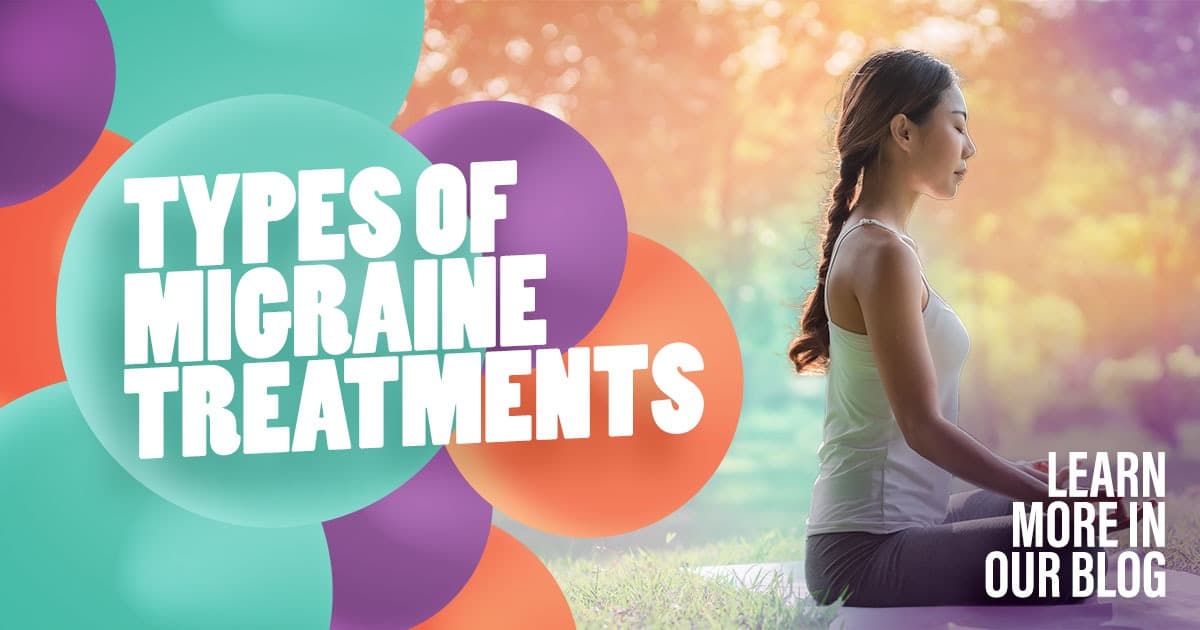For some individuals, migraines are an occasional inconvenience they can easily tolerate. For others, it’s a devastating condition that severely impacts their daily actions and quality of life. With doctor guidance, a multi-facet approach using cutting-edge migraine treatments is helping individuals better manage their migraines.
Acute: The First Signs of an Impending Migraine
At the first sign of a migraine, acute medications relieve pain and stop the migraine from progressing. For milder symptoms, over-the-counter medications like ibuprofen and acetaminophen and prescription pain relief medications like opioids are the first line of treatment.

If those options are not effective, and for moderate to severe symptoms, other types of medications are available, including:
- Triptans are medications specifically treat migraines by blocking pain pathways. Triptans come as tablets you can swallow or dissolve under your tongue or as a nasal spray or injection. Examples include:
- Sumatriptan (Imitrex®), rizatriptan (Maxalt®), zolmitriptan (Zomig®), almotriptan (Axert®), eletriptan (Relpax®), naratriptan (Amerge®), and frovatriptan (Frova®).
- Ergot alkaloids work in the same way as triptans. They are an option for patients who don’t respond to other methods.
- Migranal is a nasal spray, and Ergomar is a dissolvable tablet you place under the tongue. Dihydroergotamine comes in injection, intravenous infusion, or nasal spray (TRUDHESA™).
- Serotonin 5-HT1F Agonists are a new class of migraine drugs. It works on serotonin receptors in your brain and activates them (wakes them up). Once activated, they help block pain signals.
- Reyvow (lasmiditan) is the only 5-HT1F receptor agonist with FDA-approval.
- Calcitonin gene-related peptide (CGRP) receptor antagonists work by blocking the CGRP protein, which is associated with intensifying the pain of a migraine.
- Ubrogepant (Ubrelvy) and rimegepant (Nurtec ODT) are oral medications.
Prevention: Treatments

For people experiencing more than four migraines a month or who have very severe attacks, your doctor may prescribe a preventive medication to reduce the severity or frequency. These include:
- Blood pressure-lowering medications help prevent the blood vessels from dilating, which also helps reduce the frequency of attacks.
- These include beta-blockers such as propranolol (Inderal, InnoPran XL, others) and metoprolol tartrate (Lopressor). Calcium channel blockers such as verapamil (Verelan) are other antihypertensive medications that also prevent migraines.
- Tricyclic antidepressants affect serotonin levels and other chemicals in the brain and can prevent migraines.
- Amitriptyline (Elavil, Endep, Vanatrip).
- Anti-seizure drugs help restore the normal balance of nerve activity in the brain, which also helps prevent migraines.
- Valproate and topiramate (Topamax, Qudexy XR, others)
- Botox injections help block the pain signal pathways in the head and neck that lead to migraine pain.
- Injections of onabotulinumtoxinA (Botox) can be given about every 12 weeks.
- CGRP monoclonal antibodies are antibodies used to target and block the CGRP protein.
- Erenumab-aooe (Aimovig), fremanezumab-vfrm (Ajovy), galcanezumab-gnlm (Emgality), and eptinezumab-jjmr (Vyepti) are newer drugs approved by the FDA that are given monthly or quarterly by injection.
Migraine Patients Hold the Future Generations of Treatments in their Hands
You can learn more about managing migraines in the blog section of our website. There, you’ll find lifestyle changes, flare-up triggers, and more.
More exciting discoveries are on the horizon as researchers work to provide tools and other options that continue to reduce the impact on the lives of those with migraines. If you are living with migraines, your experiences can help ensure progress continues in care options as a study volunteer.

Migraine studies are enrolling now for adolescents and adults here at Seattle Clinical Research Center! Call (206) 522-3330 or visit our website to apply today!
Sources:
https://www.womenshealth.gov/a-z-topics/migraine
https://www.merckmanuals.com/professional/neurologic-disorders/headache/migraine
https://www.ninds.nih.gov/Disorders/All-Disorders/Migraine-Information-Page
https://americanmigrainefoundation.org/resource-library/new-migraine-treatments/
https://www.drugs.com/medical-answers/new-drugs-treatment-prevention-migraine-3515053/



